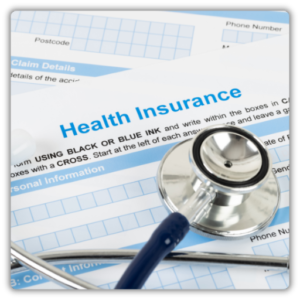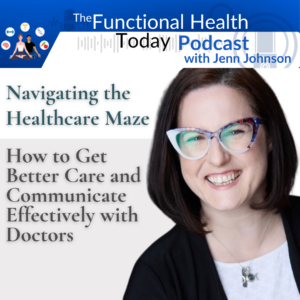
Did You Enjoy This Podcast?
Have you ever wondered how to be your own health advocate in the chaotic world of hospitals? Join ER nurse Jenn Johnson as she shares her insights on effectively navigating the medical system. Discover practical steps to ensure you receive the best care when you need it most!
Navigating the healthcare system can often feel overwhelming, especially when poor communication adds to the challenge. Many patients leave the hospital feeling confused because they struggle with doctor-patient communication. By learning practical tips for talking to your doctor and understanding how to ask your doctor the right questions, you can improve your healthcare experience. Effective strategies to communicate with patients also help ensure that your concerns are addressed and that you receive the care you need.
💡 Know Your Health Information
 Before stepping into a hospital, it’s important to be well-prepared with your medical history. Keep a record of your medications, including dosages, and any vitamins or supplements you take. Additionally, list any major health issues you’ve experienced, such as heart conditions or diabetes. Sharing this information can help the doctor provide better care and shows that communication is a two-way street. Strong communication skills allow you to ask questions and ensure the doctor knows everything necessary to personalize your treatment, ultimately helping to improve communication during your visit.
Before stepping into a hospital, it’s important to be well-prepared with your medical history. Keep a record of your medications, including dosages, and any vitamins or supplements you take. Additionally, list any major health issues you’ve experienced, such as heart conditions or diabetes. Sharing this information can help the doctor provide better care and shows that communication is a two-way street. Strong communication skills allow you to ask questions and ensure the doctor knows everything necessary to personalize your treatment, ultimately helping to improve communication during your visit.

Pop in your email below, and we’ll zip it straight to your inbox so you never lose it!
🤝 Cultivate a Collaborative Relationship with Nurses
Nurses are often the frontline caregivers in hospitals, making them essential allies in your healthcare journey. Clear communication is key, so don’t hesitate to ask them questions. They can help relay your concerns to doctors and bridge the communication gap. Patient-centered care thrives on successful communications, and by encouraging patients to ask questions, nurses help facilitate better patient communication. Effective communication skills are also important in improving patient outcomes and increasing patient satisfaction. When you’re in a busy emergency room, being direct can also help—ask specific questions to get focused answers. For example, after your assessment, saying, “I have a few questions about my diagnosis and treatment plan,” encourages a productive conversation that helps the doctor understand your needs and supports your care. This way to communicate increases patient understanding and enhances doctor-patient interactions from both the doctor’s and the patient’s point of view. Excellent communication helps the doctor provide better care and ensures that your concerns are addressed promptly.
🌟 Be a Respectful Advocate for Yourself
When interacting with healthcare providers, it’s important to remain calm and courteous, even during stressful moments. Simple gestures like complimenting a nurse’s professionalism or saying thank you can help improve overall communication and create a positive rapport. Open communication allows patients to share their concerns and helps doctors to understand their needs better. This kind of interaction fosters better communication and can encourage healthcare professionals to be more attentive and communicative. Remember, aggressive or impatient behavior typically doesn’t lead to better results; instead, active listening and respectful communication strategies help patients and doctors make better decisions together.
🩺 Inquire About Care Decisions
When receiving treatment, it’s important to ask about each step of your care. Questions like “What’s the differential diagnosis?” show your engagement and help you better understand your health management. Effective doctor-patient communication, including asking why certain tests are performed and what they aim to uncover, improves patient education and helps you feel more secure in the care you are receiving. By fostering patient-centered communication, doctors can improve their communication skills, leading to better health outcomes. Good communication skills and asking questions also help the patient stay informed, which can improve the quality of care and lead to better overall health management.
⏳ Be Prepared for Wait Times
 If you find yourself in the emergency room, it’s important to recognize that wait times can vary significantly. In some healthcare systems, for example, patients might wait anywhere from 100 to 180 hours for a bed. Understanding this helps manage your expectations and reduces frustration. Effective patient communication can lead to better understanding of the situation, and staying calm and patient is key. Remember, healthcare professionals are doing their best during extremely busy times. Having good health literacy also plays a role in patient safety, as it helps patients understand the process and the quality of patient care they can expect.
If you find yourself in the emergency room, it’s important to recognize that wait times can vary significantly. In some healthcare systems, for example, patients might wait anywhere from 100 to 180 hours for a bed. Understanding this helps manage your expectations and reduces frustration. Effective patient communication can lead to better understanding of the situation, and staying calm and patient is key. Remember, healthcare professionals are doing their best during extremely busy times. Having good health literacy also plays a role in patient safety, as it helps patients understand the process and the quality of patient care they can expect.
🤝 Participate in Your Healthcare Journey
Your health is in your hands. Taking an active role in your care by preparing questions, understanding your health, and communicating effectively with your care team can significantly enhance your experience in the healthcare system. You deserve to understand your treatment options and feel supported at every step.
Effective communication is essential for navigating the healthcare system. By advocating for yourself and engaging with your health care provider, you can foster better relationships with doctors and health care professionals. Improving communication skills—such as talking to patients and using communication tools—helps doctors improve their communication skills and ultimately leads to better care. Good communication requires effort from both doctors and patients and is key to improving health outcomes and the overall patient experience.
Did You Enjoy This Podcast?
Have you ever wondered how to be your own health advocate in the chaotic world of hospitals? Join ER nurse Jenn Johnson as she shares her insights on effectively navigating the medical system. Discover practical steps to ensure you receive the best care when you need it most!














